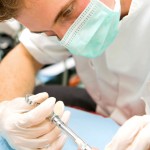
Traditionally palatal injections are used for the extraction of maxillary teeth under local anaesthesia. Patients find these uncomfortable owing the firm mucosal attachment and rich nerve supply. The need for these injections has been questioned by a number of authors.
The aim of this review was to examine the outcomes of maxillary tooth extractions using buccal injection of local anaesthetic only.
Methods
Searches were conducted in the PubMed, Embase, and Cochrane CENTRAL databases with no language restrictions. Studies that examined any outcome of the extraction of maxillary teeth (anterior and/ or premolar and/or molar), where one or more test groups used buccal injection of local anaesthetic only, were considered. Two reviewers independently selected studies and assessed risk of bias. A single reviewer carried out data abstraction. A narrative summary of the findings was presented.
Results
- 15 studies (6 RCTs, 4 CCTs, 5 uncontrolled) involving a total of 1318 patients were included.
- Sample sizes ranged from 30-200.
- 4 studies included only 3rd molars while 2 studies excluded them, two studies involved only premolars, and one study included only molars and premolars. Only 1 study involved incisor teeth.
- Lignocaine and Articaine were used for anaesthesia and all except 1 study used the same agent fro buccal and palatal injections.
- 9 controlled studies examining pain during the procedure found no statistically significant difference between the test and control groups.
Conclusions
The authors concluded:-
Nine controlled studies examining pain during the procedure found no statistically significant difference between the test and control groups. More randomized controlled trials, particularly with larger sample sizes and similar protocols, are necessary to further examine this question, which is relevant to the everyday practice of oral surgery procedures, both by general dentists and oral and maxillofacial surgeons.
Comments
A broad range of databases have been searched for this review identifying only a small number of randomised trials. None of the included studies are large and none of them could be considered to be at low risk of bias. While a majority of the included controlled studies found no differences between the test and control groups these findings need to be interpreted cautiously because of the limited quality of the included studies.
Links
Primary paper
Badenoch-Jones EK, Lincoln T. Palatal injection for removal of maxillary teeth: is it required? A systematic review. Int J Oral Maxillofac Surg. 2016 May 30. pii: S0901-5027(16)30060-1. doi: 10.1016/j.ijom.2016.05.005. [Epub ahead of print] Review. PubMed PMID: 27256010.

Are palatal injections needed for maxillary extractions ? https://t.co/IW41lHOkD8
Maxillary extractions – are palatal injections needed? https://t.co/IW41lHOkD8
[…] post Palatal injections for maxillary extractions: are they needed? appeared first on National […]
Palatal injections for maxillary extractions: are they needed? https://t.co/IW41lHOkD8
Extracting maxillary teeth- are palatal injections needed? https://t.co/IW41lHOkD8
Palatal injection for removal of maxillary teeth-are they needed? https://t.co/IW41lHOkD8
Talk about cognitive dissonance-this topic has been around but I for one still would rather give a palatal ( yes it can be done gently) than begin to put pressure with an elevator/forcep and watch the patient wince! Wish I could get the full review —
Don’t miss- Palatal injections for maxillary extractions: are they needed? https://t.co/IW41lHOkD8